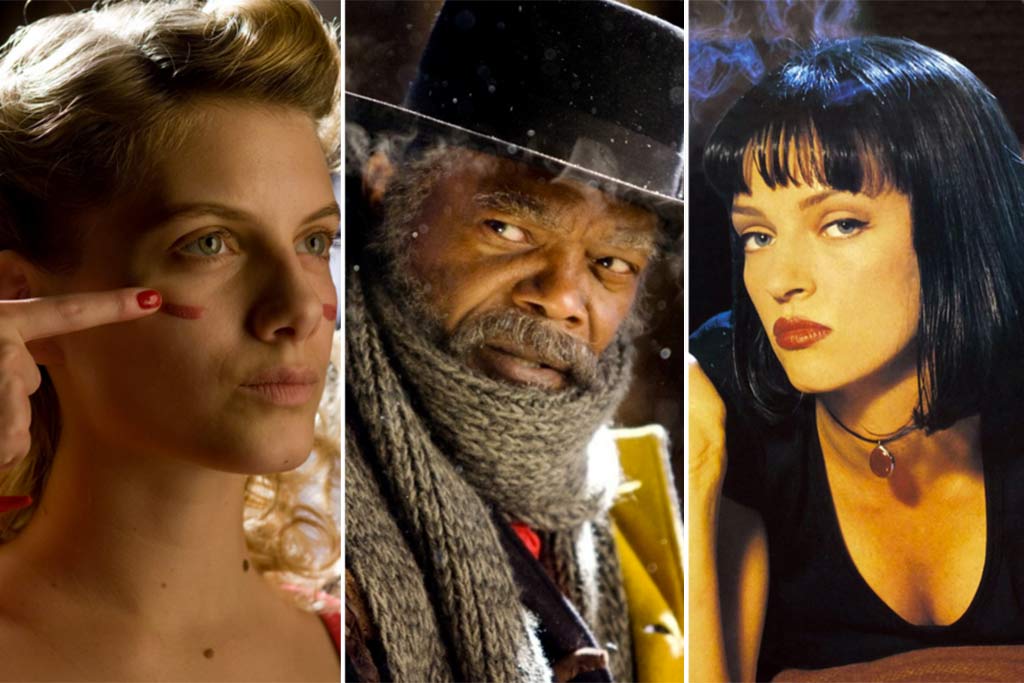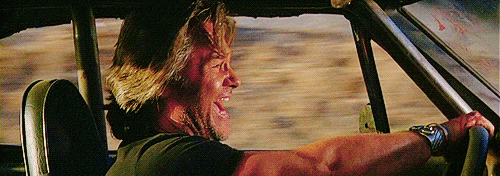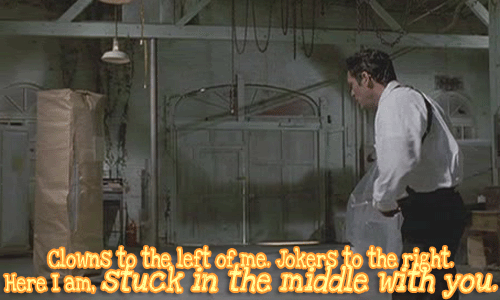Quentin Tarantino’s Eight Feature Films, Lovingly Ranked From Worst To Best
Featuring a (spoiler-free) review of his latest, 'The Hateful Eight'.

Quentin Tarantino’s eighth feature film which premieres around Australia tomorrow is called The Hateful Eight: a phrase which wouldn’t be a bad title for his entire body of work thus far. His films are notoriously angry, grotesque, exploitative and forged in the fires of grindhouse, western, martial arts, noir and blaxploitation cinema. They’re big, brutal, gaudy and often entirely tactless, but damn if they aren’t utterly wonderful.
The big question, however, is this: where does The Hateful Eight sit? Is it better than Kill Bill? Worse than Pulp Fiction? I’ve been saddled with the equally joyous and onerous task of ranking his films, from worst to best, and giving you’re a first look at The Hateful Eight in the process.
Given that there’s no way to empirically, objectively weigh the quality of each film, I’m going to be totally subjective and you can just deal with that.
–
8. Inglorious Basterds, (2009)
Already, I can see some of you gritting your teeth at the gall of putting Basterds right at the bottom. This isn’t to say I think it’s a bad film — it isn’t. But Basterds (a remake of the Fred Williamson vehicle from the ’70s) is a victim of Tarantino’s excesses as much as it is a grateful recipient of them.
It has astounding performances (most notably by Christoph Waltz and Michael Fassbender), tracts of high-tension and is visually breathtaking. It is, however, oddly paced, and it commits a cardinal sin: it purports to be a film about a gang of roughneck, rag-tag soldiers whose personalities are all vital to their functioning as a team. Then, after giving us exhilarating intros to two of the Basterds, it sloppily abandons that premise and renders the remaining team members practically faceless.
Inglorious Basterds is not a bad film, it’s just a very uneven one.

Nah.
–
7. Django Unchained, (2012)
Django Unchained is ostensibly a re-make of the Sergio Corbucci-helmed Django: a 1966 spaghetti western (a genre named as such because it was cheaper and often more fun to make revisionist Westerns in Italy rather than in America). There was one official sequel to the film, dozens of shoddy faux-sequels, but this reboot of sorts is a damn fine homage to the genre as a whole.
Though facing divided critical attention for its treatment of slavery, for my money, the film is brimming with brilliant stuff. Jamie Foxx as slave-turned-free man Django is wonderful, Christoph Waltz as his eccentric Obi Wan is superb, and Leonardo DiCaprio gives a stunning villainous turn. The film does, however, have Tarantino cameoing as an Australian with the single worst Australian accent ever committed to celluloid.
–
6. Death Proof, (2007)
What a bloody wonderful movie. Often overlooked due to being one half of the Tarantino/Rodruigez double feature Grindhouse, Death Proof is pure exploitation cinema. Kurt Russell plays a maniac who gets his rocks off by seducing young women, locking them in his muscle car, then crashing the car and skipping town. It has liberal dashes of Russ Meyer insanity up the tail end, a great soundtrack, and a wonderful cast. Rosario Dawson kicks arse, Sydney Poitier makes an appearance, and Kurt Russell is brilliant and horrible all at once.

Settle down, mate.
–
5. The Hateful Eight, (2016)
Two words: holy shit. I didn’t think The Hateful Eight would sit this high on the list, but here we are. Some interesting tidbits to begin with: Tarantino has busted the balls of cinemas, protectionists and distributors worldwide to make this film a 70mm experience. Remember how films used to be shot on, you know, film? That was typically 35mm. 70mm requires inconveniently heavy, expensive and now largely defunct cameras and projectors, because it involves flipping that film on its side to effectively double the scope and quality of the picture. It’s a frigging technological dodo and Quentin dug it up for this garish, gargantuan epic.
Secondly, it has an overture and an intermission, both movie-going staples I for one would welcome back. Having the overture (basically a medley of music from the film) playing before the film starts, then having a designated intermission halfway makes the whole thing seem grander. But in the case of The Hateful Eight, the intermission alo provides a much-needed pause in which to take a goddamned breath because holy hell, this film is exhausting.
This is not to say it isn’t brilliant, because it is. The premise is simple: eight strangers, due to a series of vague, cryptic events, end up trapped in an isolated haberdashery in the mountains during a blizzard. As with all good Sergio Leone westerns, the inhabitants of the cabin are still humming from their various run-ins with the relatively recent Civil War. They also each have simmering motivations, needs, wants, and prejudices. In that way, it’s like 12 Angry Men. A very, very stressful, violent, jarring 12 Angry Men.
Continuing what’s become a running theme in Tarantino’s work, Kurt Russell is brilliant. Samuel L. Jackson is… well, I’ve not seen him this wonderful in many years. Walton Goggins (who you might remember as the antagonist from Justified) is bloody wonderful. Jennifer Lason Leigh is upsettingly scary and Tim Roth chews the scenery so joyfully I could happily have just watched him talk for an hour. But the film, really, is a scintillatingly ambitious, brutally aggressive stage play about how America — the civil war, frontier life, and just greed in general — bring out the worst in people. It’s a shocking, vital, often silly but always engaging slap-in-the-face critique of America, Americans, and what total freedom (or a complete lack of it) did to them way back when. And now. It was just announced yesterday, the work will soon be adapted for theatre with Tarantino writing a new script for the stage.
For the music, Tarantino recruited Ennio Morricone (my favourite film composer), the man who pretty much scored the backbone of the spaghetti western. The whistling from The Good, The Bad and The Ugly? That’s him. The score contains large tracts of unused material from the score of John Carpenter’s The Thing, but that’s okay; after all, we have Kurt Russell trapped in a room full of suspicious people with an ice storm outside. It totally works.
You’ll notice I’ve also completely avoided spoilers, but I will say this: we need to talk about this film over drinks. And we need to do it pronto. This movie is often grotesque, and frequently hard to stomach, but I think it might be brilliant all the same.
–
4. Reservoir Dogs, (1992)
Tarantino’s first film as both writer and director, Dogs is a terrific bookend to The Hateful Eight. It stars two of the core cast members, and has the same pressure cooker vibe throughout. Calling it a heist film would be underselling what it really is: a very, very stressful piece of theatre. It’s a character study. Harvey Keitel, Michael Madsen and Tim Roth give brutal, realistic performances, the soundtrack is amazing, and the climax is devastating.

This song has never been the same since.
–
3. Jackie Brown, (1997)
Jackie Brown is one of the best homages to blaxploitation films ever made, giving well-deserved nods to a genre that popped up in the US as a response to the aggressive hyper-masculine slew of white-helmed action films that became so abundant through the ’60s and ’70s. Shaft, Super Fly, Black Caesar… all great movies. But the greatest films of the genre were Cleopatra Jones and anything with Pam Grier, notably Coffy and Foxy Brown. Because of this Tarantino grabbed Grier, cast her as an ageing, but immensely sympathetic, powerful, flawed and wonderful heroine, surrounded her with a powerhouse cast (Robert DeNiro, Samuel L. Jackson, Robert Forster, Michael Keaton), and adopted a brilliantly, misleadingly laidback pace.

…Mostly laidback.
–
2. Pulp Fiction, (1994)
An obvious choice, right? But Pulp Fiction is one of the cleanest, tightest and best films ever made. Period. It doesn’t matter how artsy your tastes go, or how adverse you are to slightly left-of-centre movie-making; Pulp Fiction has it all. It revitalised the careers of John Travolta and Bruce Willis, put Uma Thurman and Samuel L. Jackson on the map, and… I mean, have you seen this movie? Seriously, have you? Because if you have, nothing I’m saying is new to you, and if you haven’t, then pour yourself a drink and watch it right now. You’ll be glad you did.
–
1. Kill Bill Vol. 1 & 2, (2003-04)
So it turns out that Quentin Tarantino counts both parts of Kill Bill as one movie! How can this not be his best work? It has Uma Thurman going on a revenge spree. The Crazy 88. Hattori Hanzo. Kung fu. It has EYEBALL-STOMPING.

Sorry.
This movie (well, movies) has everything. It’s also has a joyous bent which Tarantino has shied away from in recent years, meaning it has a real sense of adventure and closure, despite being grim as hell at times. Volume One is a ruthless samurai epic, and Volume Two is part jianghu martial arts training movie, part revisionist western. If you’ve never experienced the utter joy that is Kill Bill, you honestly have not lived.
–
The Hateful Eight is in Australian cinemas from tomorrow.
–
Paul Verhoeven is a Jim Henson’s Creature Workshop creation. He hosts Save Point, writes for TheVine, and is a presenter on Triple J, and tweets from @PaulVerhoeven.